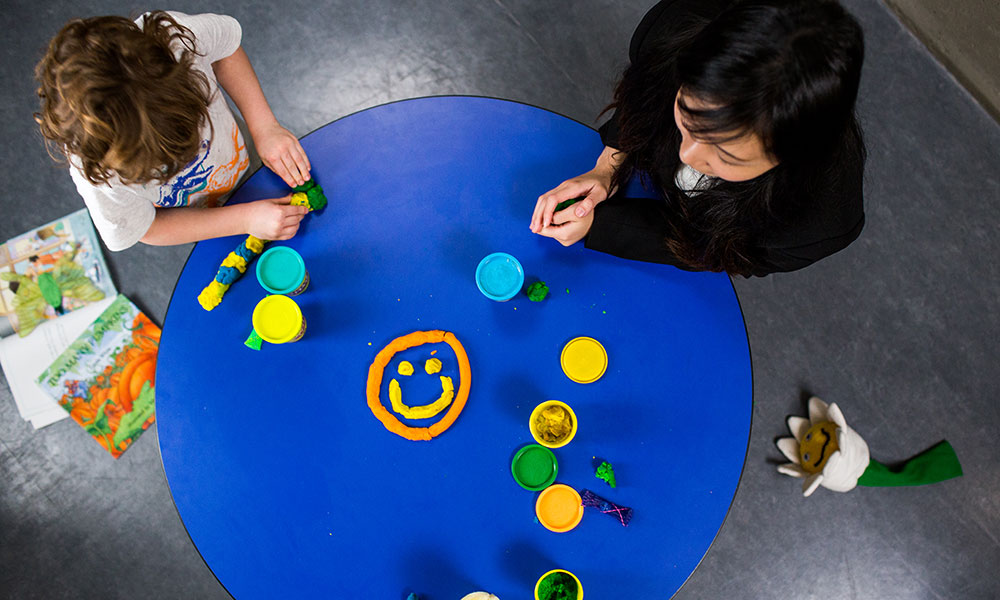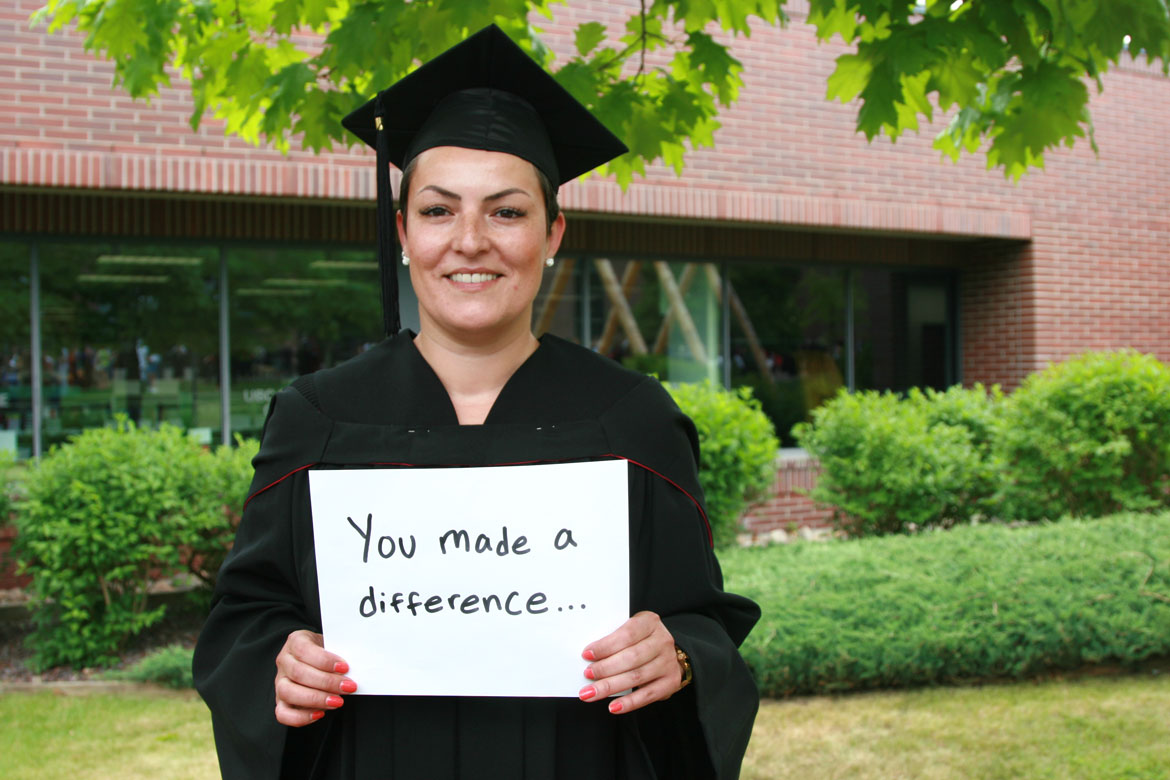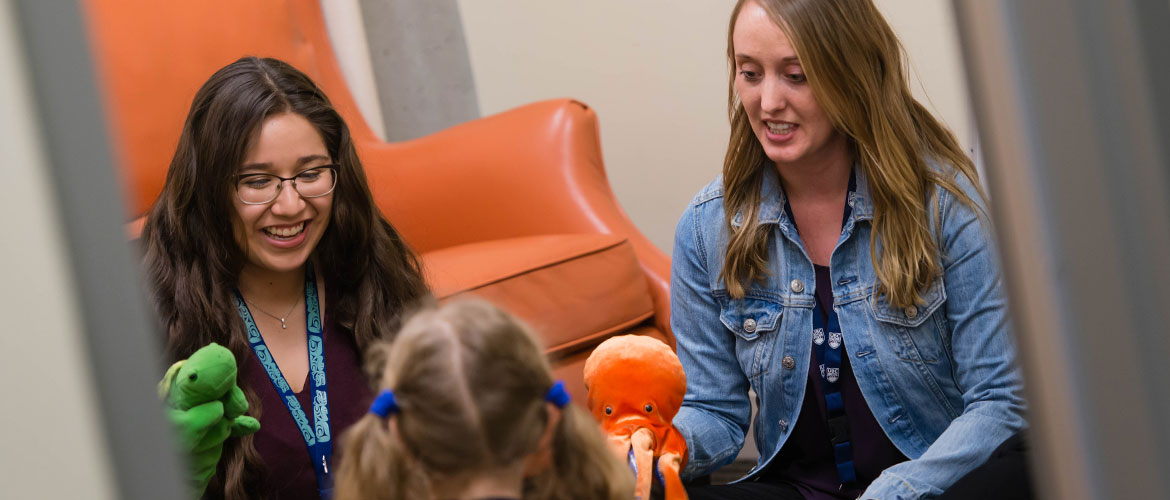
MENTAL ILLNESS WILL IMPACT MANY OF US IN SOME WAY DURING OUR LIVES. For alumna Zarka Stojanovic, it came early in her teens, when she experienced a loved one’s struggle with mental illness.
This led her to the field of psychology to understand the brain and, from there, culminated to the pursuit of a master’s degree in social work at UBC Okanagan.
“I entered the Master of Social Work program because not only did I want to understand how the mind works, but I also want to prevent some of the devastating consequences of being ill,” she says.
Stojanovic recently graduated from the program, where she was the inaugural recipient of the Matthew Yip Memorial Award for Outstanding Field Training in Social Work. The award is named after an accomplished student who struggled with depression and succumbed to suicide following graduation.
Stojanovic says receiving the award and meeting Yip’s parents was emotional—triggering her own history—but it also validated her career choice and her drive to help those in need.
She credits her specialized field training at UBC Okanagan School of Social Work’s Mental Health Clinic with giving her vital skills and empowering her to turn her drive into reality.
“I now have the wrap-around knowledge, from the science to the applied skills, to coach those with mental health issues.”

From textbook to therapy
As with all university programs, Stojanovic’s path started with hard work. UBC Okanagan’s Master of Social Work (MSW) degree requires its students to complete 450 hours of field education each year of study, where they apply and practice the theory they’ve learned.
Students request placements based on their learning goals and areas of practice in which they are interested. The School of Social Work has around 100 diverse partner organizations which provide critical field education training to UBCO MSW students every year.
Completing a field education placement in the School of Social Work’s Mental Health Clinic, located in the UBC Interprofessional Clinic on UBCO’s campus, was a natural fit for Stojanovic. At the clinic, students learn to assess and provide multi-faceted interventions to children and youth with moderate to severe mental health concerns, including anxiety, depression, suicidal and self-harming behaviours, attention-deficit hyperactivity disorder (ADHD), and psychosomatic difficulties.
“We educate and train master of social work students while providing families with effective, evidence-based solutions,” explains clinic director Hilla Shlomi, also an alumna of UBCO’s social work program.
“We collaboratively work with children, their parents, and the child’s school and other health professionals when appropriate, to develop an individualized plan that includes tangible solutions for the most pressing concerns about the children’s behaviour and their mental health needs.”
Master of Social Work student clinicians like Stojanovic provide the services while being observed and mentored by senior mental health clinicians. The students receive guidance and feedback before and after each meeting with a child or a parent. All clinic sessions are video-recorded so students can review previous sessions and engage in additional self-reflection and self-correction.
“Your words can alter lives.”
Stojanovic explains that the clinic training is what she appreciated most about her MSW education. “Most people can read and understand the theoretical material, but the clinic experience cannot be learned from a book.” she says. “You have to think on your feet, be ready and take the sessions seriously. Your words can alter lives.”
Stojanovic adds that the clinic was instrumental in developing her skills in talking with families and in thinking about therapies. “This was a transformative experience. I learned that social work is a bi-directional process where both the counsellor and the client evolve.”

Unique in Canada
The Social Work Mental Health Clinic is the only one of its kind in Canada, an on-campus space where not only future mental health professionals are trained but also client-children are assessed and treated.
“Very few schools provide their students access to working centres like ours, or allow their students to provide direct service in the school’s clinic, let alone associate with the management team of that clinic,” says clinic co-founder Edward Taylor, associate dean of UBC Okanagan’s Faculty of Health and Social Development.
The unlimited number of sessions, no-fee service, and the built-in parental education and support all add to the clinic’s uniqueness, adds Shlomi.
“The focus of our services is the child, but parents are also counselled,” she says. “We don’t advocate a blaming environment. Parents are part of the solution.”
As a student, Stojanovic says the immediate hands-on clinical experience is unique and can be a bit daunting, yet she never felt unsupported. “I started seeing real people right away and my learning started from that moment.”
She is thankful for the vigilant supervision and different opportunities for mentoring and consultation. “I had great support all the time. It was a constant feed-back loop.”
Learn more about
Do you have what it takes?
According to Taylor, a master’s degree in social work is a sought-after credential for many professionals, and essential for those who wish to be a Registered Clinical Social Worker. Students with undergraduate degrees in psychology, sociology, women’s studies and interdisciplinary studies—to mention just a few—have all applied to UBCO’s social work program.
“There’s not one size fits all for social workers. They come from different backgrounds and with different experiences,” he says.
This was the case for Stojanovic. She applied as a mature student and says being older than her classmates wasn’t a barrier. It even had its advantages. “Even though there was an age gap, I developed significant relationships. As a mature student, I felt more self-directed than some of my peers.”
John Graham, director of UBC Okanagan’s School of Social Work, says the career pursuit isn’t for the faint of heart. “Social work is a challenging profession—you must be resilient, empathetic and objective, traits that are sometimes difficult to have on a continuous basis.”
“For the right person, social work is the most beautiful career imaginable.”
As a result, admission decisions to the program are done with careful consideration. “We need to recruit the very best bright people who care, are skilled, and who have a deep capacity to make a difference.”
He suggests that you can’t help someone else unless you understand yourself. “For the right person, social work is the most beautiful career imaginable,” he says.
Stojanovic couldn’t agree more. “I have found my purpose.”